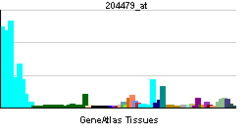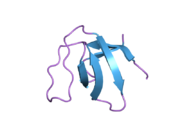- OSTF1
-
Osteoclast stimulating factor 1 
PDB rendering based on 1x2k.Available structures PDB 1X2K, 1ZLM, 3EHQ, 3EHR Identifiers Symbols OSTF1; FLJ20559; OSF; SH3P2; bA235O14.1 External IDs OMIM: 610180 MGI: 700012 HomoloGene: 8227 GeneCards: OSTF1 Gene Gene Ontology Molecular function • protein binding
• SH3 domain binding
• identical protein bindingCellular component • intracellular
• cytoplasmBiological process • ossification
• signal transductionSources: Amigo / QuickGO RNA expression pattern 
More reference expression data Orthologs Species Human Mouse Entrez 26578 20409 Ensembl ENSG00000134996 ENSMUSG00000024725 UniProt Q92882 Q62422 RefSeq (mRNA) NM_012383 NM_017375.3 RefSeq (protein) NP_036515 NP_059071.1 Location (UCSC) Chr 9:
77.7 – 77.76 MbChr 19:
18.65 – 18.71 MbPubMed search [1] [2] Osteoclast-stimulating factor 1 is a protein that in humans is encoded by the OSTF1 gene.[1][2]
References
- ^ Reddy S, Devlin R, Menaa C, Nishimura R, Choi SJ, Dallas M, Yoneda T, Roodman GD (Apr 1999). "Isolation and characterization of a cDNA clone encoding a novel peptide (OSF) that enhances osteoclast formation and bone resorption". J Cell Physiol 177 (4): 636–45. doi:10.1002/(SICI)1097-4652(199812)177:4<636::AID-JCP14>3.0.CO;2-H. PMID 10092216.
- ^ "Entrez Gene: OSTF1 osteoclast stimulating factor 1". http://www.ncbi.nlm.nih.gov/sites/entrez?Db=gene&Cmd=ShowDetailView&TermToSearch=26578.
Further reading
- Maruyama K, Sugano S (1994). "Oligo-capping: a simple method to replace the cap structure of eukaryotic mRNAs with oligoribonucleotides.". Gene 138 (1–2): 171–4. doi:10.1016/0378-1119(94)90802-8. PMID 8125298.
- Suzuki Y, Yoshitomo-Nakagawa K, Maruyama K, et al. (1997). "Construction and characterization of a full length-enriched and a 5'-end-enriched cDNA library". Gene 200 (1–2): 149–56. doi:10.1016/S0378-1119(97)00411-3. PMID 9373149.
- Sparks AB, Hoffman NG, McConnell SJ, et al. (1998). "Cloning of ligand targets: systematic isolation of SH3 domain-containing proteins". Nat. Biotechnol. 14 (6): 741–4. doi:10.1038/nbt0696-741. PMID 9630982.
- Schaub R, Dupont B, Roodman GD, et al. (2000). "Assignment of OSTF1 to human chromosome bands 12q24.1→q24.2 by in situ hybridization". Cytogenet. Cell Genet. 88 (1–2): 87–8. doi:10.1159/000015492. PMID 10773673.
- Kurihara N, Menaa C, Maeda H, et al. (2001). "Osteoclast-stimulating factor interacts with the spinal muscular atrophy gene product to stimulate osteoclast formation". J. Biol. Chem. 276 (44): 41035–9. doi:10.1074/jbc.M100233200. PMID 11551898.
- Strausberg RL, Feingold EA, Grouse LH, et al. (2003). "Generation and initial analysis of more than 15,000 full-length human and mouse cDNA sequences". Proc. Natl. Acad. Sci. U.S.A. 99 (26): 16899–903. doi:10.1073/pnas.242603899. PMC 139241. PMID 12477932. http://www.pubmedcentral.nih.gov/articlerender.fcgi?tool=pmcentrez&artid=139241.
- Szymkiewicz I, Destaing O, Jurdic P, Dikic I (2004). "SH3P2 in complex with Cbl and Src". FEBS Lett. 565 (1–3): 33–8. doi:10.1016/j.febslet.2004.03.100. PMID 15135048.
- Humphray SJ, Oliver K, Hunt AR, et al. (2004). "DNA sequence and analysis of human chromosome 9". Nature 429 (6990): 369–74. doi:10.1038/nature02465. PMC 2734081. PMID 15164053. http://www.pubmedcentral.nih.gov/articlerender.fcgi?tool=pmcentrez&artid=2734081.
- Gerhard DS, Wagner L, Feingold EA, et al. (2004). "The Status, Quality, and Expansion of the NIH Full-Length cDNA Project: The Mammalian Gene Collection (MGC)". Genome Res. 14 (10B): 2121–7. doi:10.1101/gr.2596504. PMC 528928. PMID 15489334. http://www.pubmedcentral.nih.gov/articlerender.fcgi?tool=pmcentrez&artid=528928.
- Rual JF, Venkatesan K, Hao T, et al. (2005). "Towards a proteome-scale map of the human protein-protein interaction network". Nature 437 (7062): 1173–8. doi:10.1038/nature04209. PMID 16189514.
- Li M, Meng Z, Xu Y, et al. (2006). "Crystallization and preliminary X-ray crystallographic analysis of osteoclast-stimulating factor". Acta Crystallogr. Sect. F Struct. Biol. Cryst. Commun. 61 (Pt 1): 128–30. doi:10.1107/S1744309104031653. PMC 1952375. PMID 16508112. http://www.pubmedcentral.nih.gov/articlerender.fcgi?tool=pmcentrez&artid=1952375.
- Chen L, Wang Y, Wells D, et al. (2006). "Structure of the SH3 domain of human osteoclast-stimulating factor at atomic resolution". Acta Crystallogr. Sect. F Struct. Biol. Cryst. Commun. 62 (Pt 9): 844–8. doi:10.1107/S1744309106030004. PMC 2242886. PMID 16946461. http://www.pubmedcentral.nih.gov/articlerender.fcgi?tool=pmcentrez&artid=2242886.
- Olsen JV, Blagoev B, Gnad F, et al. (2006). "Global, in vivo, and site-specific phosphorylation dynamics in signaling networks". Cell 127 (3): 635–48. doi:10.1016/j.cell.2006.09.026. PMID 17081983.
- Ewing RM, Chu P, Elisma F, et al. (2007). "Large-scale mapping of human protein–protein interactions by mass spectrometry". Mol. Syst. Biol. 3 (1): 89. doi:10.1038/msb4100134. PMC 1847948. PMID 17353931. http://www.pubmedcentral.nih.gov/articlerender.fcgi?tool=pmcentrez&artid=1847948.
PDB gallery Categories:- Human proteins
- Chromosome 9 gene stubs
Wikimedia Foundation. 2010.


